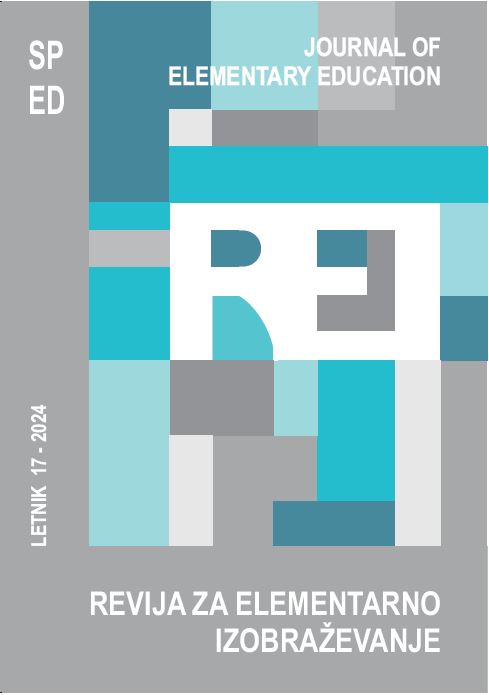Analiza strategij učiteljev prvih razredov za razvijanje bralne pismenosti v angleščini v večjezičnih razredih v Namibiji
Povzetek
Namen raziskave je analizirati, kako učitelji prvih razredov osnovne šole razvijajo bralno pismenost v večjezičnih okoljih v Namibiji. Uporabili smo pristop študije primera, zbiranje podatkov pa je potekalo s pomočjo intervjujev in opazovanjem pouka. Rezultati raziskave kažejo, da učitelji za razvijanje bralnih zmožnosti ne uporabljajo strukturiranega ali sistematičnega pristopa za podporo učencem pri branju, zanašajo se predvsem na metodo prevajanja in redko uporabljajo diferenciranih dejavnosti. Raziskava kaže na potrebo po novih pristopih k usposabljanju učiteljev, ki pri razvijanju bralnih zmožnosti v ospredje postavljajo na učenca osredotočeno poučevanje in s tem več poudarka na perspektive učencev pri branju v večjezičnih kontekstih.
Prenosi
Literatura
Afflerbach, P., Pearson, P.D., & Paris, S. (2017). Skills and strategies: Their differences, their relationships, and why they matter. In K. Mokhtari (Ed.), Improving reading comprehension through metacognitive reading strategies instruction (pp. 33–49), Rowman & Littlefield
Baker, C. (2011). Foundations of bilingual education and bilingualism, 5th edn Clevedon: Multilingual Matters
Bakhtin, M. M. (1981). The dialogic imagination: Four essays, Austin, University of Texas Press
Bellert, A. (2015). ‘Effective re-teaching. Australian Journal of Learning Difficulties, 20, 163–183. doi:10. 1080/19404158.2015.1089917
Carnine, D. W., Silbert, J., Kame’enui, E. J., & Tarver, S. G. (2010). ‘Direct instruction reading’ (5th ed.), Merrill
Collentine, K. (2016). ‘The effect of reading on second-language learners’ production in tasks’, Hispania, 99(1), 51-65.
Cunningham, A. E., & Stanovich, K. E. (1997). Early reading acquisition and its relation to reading experience and ability 10 years later. Developmental psychology, 33(6), 934.
Deng, F., & Zou, Q. (2016). ‘A study on whether the adults’ second language acquisition is easy or not – From the perspective of children’s native language acquisition, Theory and Practice in Language Studies, 6(4), 776- 780.
Garcia, E., & Weiss, E. (2019). Teachers need better professional development opportunities and more support. Economic Policy Institute.
García, O., & Wei, L. (2014). Translanguaging: Language, bilingualism, and education. Palgrave Macmillan
González, N., Moll, L. C., Amanti, C. (2005). Funds of knowledge: Theorizing practices in households, communities, and classrooms, Lawrence Erlbaum.
Gupta, A. (2019), ‘Principles and Practices of Teaching English Language Learners’, International Education Studies 12(7), 49–57
Hopewell, S., Escamilla, K. (2014). ‘Struggling reader or emerging bi-literate student? Reevaluating the criteria for labelling emerging bilingual students as low achieving’. Journal of Literacy Research, 46(1), 68-89. https://doi:10.1177/1086296X13504869
Landerl, K., Freudenthaler, H. H., Heene, M., De Jong, P. F., Desrochers, A., Manolitsis, G., & Georgiou, G. K. (2019). Phonological awareness and rapid automatized naming as longitudinal predictors of reading in five alphabetic orthographies with varying degrees of consistency. Scientific Studies of Reading, 23(3), 220–234.
Namrullah, Z., & Nasrullah, A. (2020). Enhancing reading comprehension through translanguaging strategy. Journal of Language Teaching and Research, 11(6), 970–977.
Merriam, S. B. (2009). Qualitative research: A guide to design and implementation. Jossey-Brass
Ministry of Basic Education, Sports, and Culture, (2003). The Language Policy for Schools in Namibia, NIED
Ministry of Education, Art, and Culture, (2016). National Curriculum for Basic Education, Namibia, NIED.
Morrison, G., Woika, M. J., & Breffni, L. (2020). Fundamentals of early childhood education, Pearson.
Pirih A. (2015). Who Says They Don’t Read? Slovene Elementary School Students’ Reading Motivation in EFL. Journal of Elementary Education, 8(1/2), 113–132. https://journals.um.si/in–dex.php/education/article/view/419
Pirih A. (2019). Extensive Reading and Changes to Reading Motivation in EFL among Slovene Primary School Pupils. Journal of Elementary Education, 12(4), 291–314. https://doi.org/10.18690/rei.–12.4.291-314.2019
Suganda, L. A. (2016). Teaching reading for young learners in EFL context. The Journal of English Literacy Education: The Teaching and Learning of English as a Foreign Language, 3(1), 80–88.
Strauss A.M. & Bipath, K. (2020). Expanding vocabulary and sight word growth through guided play in a pre-primary classroom, South African Journal of Early Childhood Education, 10(1),1–9
Strauss, A. M., & Bipath, K. (2020). Exploring the influence of parents' home reading practices on emergent literacy. Journal for Language Teaching= Ijenali Yekufundzisa Lulwimi= Tydskrif vir Taalonderrig, 54(1), 195–213.
Strauss, A.M. (2017). ‘A dialogical approach for improving early literacy teaching in
multilingual pre-primary contexts’, [PhD Thesis], University of Pretoria, South Africa.
Uwezo. (2016). ‘Are our children learning?’ Uwezo Uganda Sixth Learning Assessment Report, Twaweza East Africa.
Vaish, V., & Subhan, A. (2015). Translanguaging in a reading class. International Journal of Multilingualism, 12(3), 338–357.
Vygotsky, L. (1978). Mind in Society, Harvard University Press.
Winskel, H. (2010). Learning to read in multilingual contexts. Multilingual norms, 237–247.
Yin, R. K. (2009). Case study research: Design and methods, 4th edn Sage
Copyright (c) 2024 Annaly Magda Strauss

To delo je licencirano pod Creative Commons Priznanje avtorstva 4.0 mednarodno licenco.
